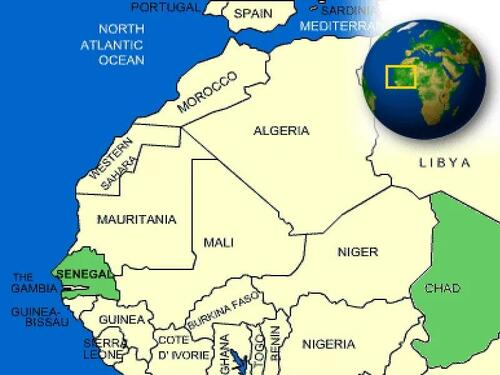Authored by Andrew Korybko via Substack,
France and the US are expected to apply a three-pronged policy for pushing back against this...
Thursday was an historic day for African geopolitics since Chad announced that it’s expelling French troops while Senegal said that it plans to do the same in the near future. These are France’s last military outposts in the Sahel after it was expelled from Burkina Faso, Mali, and Niger, which now form the Sahelian Alliance that’s also merging into a Confederation. The immediate consequence is that Russian influence will likely surge while France is expected to turn the Ivory Coast into its top regional base.
These trends align with the larger one of Africa becoming a theater of competition in the New Cold War. The West wants to retain its declining unipolar hegemony while Russia and China are leading the push by the non-West to accelerate multipolar processes there. The first manifests itself through coups, Color Revolutions, and insurgencies (collectively known as Hybrid War) while the second takes the form of Russia helping its partners counteract these threats as China provides no-strings-attached economic aid.
The latest development confirms that the African Hinterland is the continent’s bastion of multipolarity while the coastal periphery serves as both the entry point and redoubt for unipolarity, which mirrors the dynamics in Eurasia. This in turn lends further credence to Professor Alexander Dugin’s theory about the historical rivalry between land powers and sea powers. In the African context, Eurasia’s land powers are helping their fellow Hinterland partners liberate themselves from the influence of Eurasia’s sea powers.
These same sea powers, in this case France (which historically has a dual sea-land identity) and the US, are now retreating to the sea-aligned Ivory Coast after being kicked out of the Sahel. This will place more pressure on Nigeria, which is an African land power that has a long history of close ties with Western sea powers like the UK and the US. The aforesaid were on full display during summer 2023’s Western-backed debacle after it unsuccessfully pressured Niger to reinstall its ousted leader and threatened to invade it.
The failure to reap any tangible dividends from this needlessly aggressive policy led to a grand strategic rethinking that culminated in Nigeria becoming an official BRICS partner after October’s summit. This was a positive step, but nothing has yet been done to resolve the country’s infamous corruption nor its seemingly intractable spree of long-running ethno/religious-regional conflicts, both of which can be externally exacerbated by the West to manipulate its foreign policy or punish it if this approach fails.
It's one thing for the West to lose its geostrategic position in the Sahel, which includes some of the world’s poorest countries (Senegal is head and shoulders above the rest but still has lots of poverty), and another entirely to lose Nigeria, which has huge energy reserves and is Africa’s most populous country. France and the US’ post-Sahelian retrenchment in the Ivory Coast is only useful insofar as providing a base from which to destabilize the Sahelian Alliance/Confederation but is useless vis-à-vis Nigeria.
Observers can accordingly expect the West (led by the US and France) to apply a three-pronged policy for pushing back against the latest multipolar achievements: 1) more Hybrid War against the Sahelian Alliance/Confederation; 2) more outreaches to Nigeria; and 3) Hybrid War against it too if this fails. The Ivory Coast will play a central role in the first aspect; the second will take diplomatic and economic forms; while the third can manifest through covert support (including military) for existing armed groups.
No suggestion is being made about the success of this predicted policy, just that part or all of this sequence will likely unfold due to the friction between Western/non-Western and unipolar/multipolar interests in Africa, which was worsened by France’s latest military blow in the Sahel. It and the US might still need time to cook up a plan for how to most effectively respond to everything, but nobody should doubt that they’ll do something, and whatever it is will be aimed at restoring their lost hegemony.
Source link


